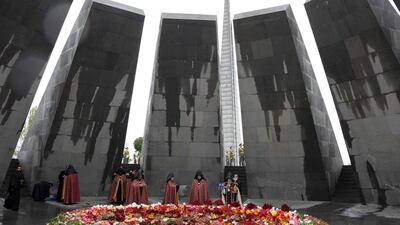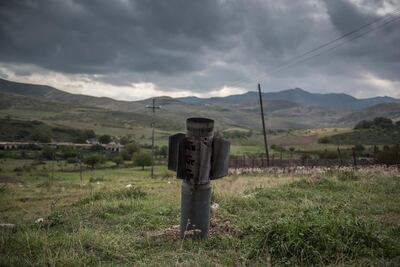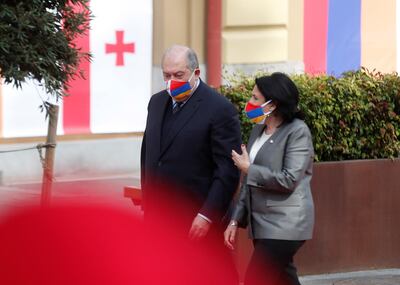A little-known yet surprisingly influential player in US-Turkish relations strolled out of a California jail last month with little fanfare.
In January 1982, Harry Sassounian and an accomplice approached the car of Turkish Consul General Kemal Arikan in a ritzy area of Los Angeles before shooting and killing the diplomat. It came not long after Ronald Reagan had become the first US president to use the “g-word” to describe the killing of around 1.5 million Armenians in eastern Anatolia before, during and after the First World War. "Like the genocide of the Armenians before it,” he said in an April 1981 speech, “the lessons of the Holocaust must never be forgotten."
But Sassounian’s assassination of Arikan is thought to have convinced Reagan that Turkey and the US were on the same side in the fight against terrorism. That, along with Turkish support in the Cold War, spurred him to align Washington more closely with Turkey, which accepts that many Armenians were killed a century ago but argues that those deaths occurred amid the fog of war and do not constitute genocide. Appreciating the need for strong US-Turkey ties, Reagan set aside the genocide label, and each successive president followed suit. Until now.
"We remember the lives of all those who died in the Ottoman-era Armenian genocide and recommit ourselves to preventing such an atrocity from ever again occurring,” Mr Biden said on Saturday, the 106th anniversary of the start of the bloodletting.
Mr Biden is the first US president in 40 years to acknowledge the Armenian genocide. Like Barack Obama, for whom he served as vice president, Mr Biden promised on the campaign trail that, once in office, he would recognise the Armenian genocide. In his eight years as president, however, Mr Obama never followed through, though he needed only four days to apply the genocide label to ISIS’s persecution of Yazidis. Now Mr Biden has taken that final step.
The move was widely expected, and dovetails with a global shift. The historical evidence, based on work done by the International Association of Genocide Scholars, favours the Armenian view, that ethnic Armenians faced an intentional eradication campaign from the last ruling clique of the Ottoman Empire, known as the Young Turks or Committee of Union and Progress (CUP). The International Association of Genocide Scholars is unanimous in its genocide designation, and a number of historians have, in recent years, argued that a three-decade Ottoman campaign targeted not just Armenians, but all of the region’s Christians, including Greeks and Assyrians, killing 3 million in all.
The European Parliament has recognised the Armenian massacre as genocide on five different occasions. The Dutch Parliament has passed at least four Armenian "genocide resolutions", as has the US Congress, in addition to a US State Department acknowledgement to the International Court of Justice way back in 1951. Thirty-two countries, including 11 of Turkey’s Nato allies, have recognised it as genocide.
Such moves foil Turkey’s expensive lobbying campaigns and thus prompt a rebuke from Ankara, which has declared recognitions “null and void”, and denounced “an evil gang forming against us”. A few years ago, the Turkish position even drove President Recep Tayyip Erdogan to condemn one of the world’s most revered figures, the Pope. Turkey has, in recent years, taken an authoritarian turn domestically while embracing a vehemently independent foreign policy, frustrating its western partners. Recognising the Armenian genocide may send the message that Ankara has crossed the line.
What's more, Mr Biden has made a robust liberalism the central focus of his foreign policy, no matter the diplomatic cost. In recent weeks, he has described Russian President Vladimir Putin as a "killer" and joined the UK, EU and Canada in blacklisting Chinese officials and entities. The fact that Mr Biden spent three months in office before speaking to his Turkish counterpart on the phone – and then spent part of their first conversation on Friday telling Mr Erdogan he would recognise the Armenian genocide – gives us some idea of where he ranks relations with Turkey.
Thanks to a slew of running disagreements, bilateral relations are so strained that recognition is just one more log on the fire. Ankara’s purchase of Russian-made missile defences, jailing of countless journalists and political figures and pulling out of the Istanbul Convention, the possible extradition from the US of Turkey’s lead suspect in the 2016 failed coup, the looming fine on Turkey’s state-run Halkbank – the list goes on and on.
With US-Turkey ties at such a low ebb, how much damage can this really do? It's not outside the realm of possibility that Mr Biden's recognition of the genocide ends up being the straw that breaks the camel's back, but this camel has shown the strength of Atlas, and it seems silly to doubt it now.
In the days ahead, Turkey’s pro-government media will likely let anti-Americanism run wild, top officials will issue one condemnatory statement after another and Ankara may retaliate, perhaps with sanctions or forcing the US military out of Incirlik airbase. None of this is likely to dissolve what is already a deeply troubled marriage.
So why does Turkey persist in its position? The government may fear that recognition will spur Armenian requests for territory and reparations, even though the possibility of such requests gaining wide acceptance is remote. The likelier issue is that acknowledging the CUP’s role in the genocide is akin to admitting one’s grandfather was a Nazi.
Many Young Turks fought in the War for Independence and took key positions in the early republic after its founding by Mustafa Kemal Ataturk in 1923. "For us to actually face our history and accept the reality of Armenian Genocide," historian Taner Akcam said in 2013, "means to wrestle with our very identity as Turks."
This would only make them human. The British and French have India and Algeria, respectively. Americans live with the horrors of slavery and the near-eradication of native tribes. Germans have the Holocaust, South Africans apartheid and so on. Turkey seeks entry into the club of developed, civilised nations, but it remains one of the very few to persist in denial of history.
Turkish acknowledgement would reduce the possibility of genocide-like crimes today, and likely lead to renewed relations with Armenia and enhance Ankara’s international reputation. And it would not be entirely unfamiliar territory for Mr Erdogan’s Justice and Development Party (AKP), which has been in power for nearly 20 years. In 2005, Istanbul’s Bilgi University was allowed to hold the country’s first conference on Ottoman Armenians.
In the years that followed, historians such as Akcam began to acknowledge the genocide in popular books, while op-eds and news articles openly discussed the issue. On Remembrance Day in 2014, Mr Erdogan took an unprecedented step, conveying condolences to the grandchildren of Armenians killed.
The following year, violence resumed between the state and Kurdish militants, which spurred the rise of ultra-nationalists who would never stomach any insult to Turkish pride, much less an admission of genocide. Sooner or later, Ankara is likely to acknowledge and shoulder some responsibility. Until then, it will remain a sore spot, a festering open wound that leaves Turkey in constant anxiety of foreign poking and prodding.
Back in 1984, Sassounian was sentenced to life in prison without parole, as prosecutors argued he had targeted the Turkish diplomat out of vengeance for the Armenian genocide. But in 2002 – coincidentally the year the AKP came to power in Turkey – prosecutors dropped this element of the case in return for Sassounian apologising and admitting his guilt. This made him eligible for parole, which he was granted this March, on his fourth try.
Nearly 40 years after his brazen attack convinced Reagan that Turkey and the US were fighting the same foe, Sassounian is a free man and the Armenian genocide is recognised the world over. Meanwhile, US troops are battling ISIS, to which Turkey initially turned a blind eye, in partnership with Syrian Kurdish militants that Turkey views as terrorists.
It’s all come full circle.
David Lepeska is a Turkish and Eastern Mediterranean affairs columnist for The National




